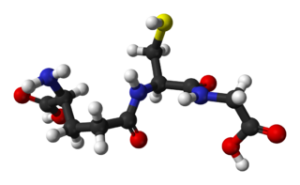N-Acetylcysteine may help protect the liver from non-alcoholic fatty liver disease, alcohol damage, and other conditions.

- Antioxidant activity. NAC helps produce the antioxidant glutathione, which plays a key role in protecting the liver from damage.
Overview
N-Acetylcysteine (NAC) is a natural compound that turns into the amino acid L-cysteine when ingested. In turn, L-cysteine helps produce glutathione (GSH) – one of the body’s main antioxidants.
Clinicians often use NAC for conditions where the body’s GSH levels are low or depleted, such as immune system concerns, lung, heart, and liver conditions. For example, NAC is extensively used to protect the liver from damage caused by acetaminophen (Tylenol) overdose, and is utilized for liver transplants. 1
As a dietary supplement, NAC is used to support the immune system, clear mucus, and help with OCD, anxiety, Alzheimer’s and other cognitive issues. Some people also take it before alcohol consumption to help protect the liver, and for other liver concerns such as non-alcoholic fatty liver and hepatitis C.

How N-Acetylcysteine Might Help With Liver Health
Antioxidant activity

N-Acetylcysteine Uses & Benefits for Liver Health
Some people take N-acetylcysteine to help with chronic liver conditions such as non-alcoholic fatty liver and hepatitis C. In addition to this, NAC can also be taken prior to alcohol consumption to help protect the liver from damage. However, it should be noted that taking NAC during or after drinking can actually have the opposite effect, worsening the effects of alcohol.
There are several human studies highlighting the liver benefits of NAC, particularly in the context of non-alcoholic fatty liver. In addition, animal studies support NAC’s ability to protect the liver from alcohol and other toxins, as well as chronic liver conditions. Taken together, this evidence supports the use of NAC for liver health.
Research
Animal Research
Animal and isolated cell culture studies of NAC report multiple liver-protective effects. Specific findings indicate that N-acetylcysteine:
- Slows the progression of nonalcoholic steatohepatitis (NASH) in rats 5
- Protects against liver damage and injury in rats 6 7
- Protects the liver against alcohol damage 8
Human Research
Human studies of N-acetylcysteine suggest that it protects against non-alcoholic fatty liver disease and other types of liver damage such as acute liver failure.
N-acetylcysteine (1200 mg) may improve liver function in non-alcoholic fatty liver disease
This study examined the effects of N-acetylcysteine (NAC) on non-alcoholic fatty liver disease. A total of 30 people with non-alcoholic fatty liver were given vitamin C (1000 mg) or N-acetylcysteine (600 mg) twice daily for 3 months. Only the NAC group experienced a significant reduction in alanine aminotransfrase (ALT) enzyme levels, indicating improved liver function.
- The researchers concluded that “N-acetylcysteine can improve liver function in patients with non-alcoholic fatty liver disease.” 9
This randomized study evaluated the effects of N-acetylcysteine (NAC) on non-alcoholic steatohepatitis (NASH). A total of 35 patients were divided into two groups: control (no treatment) or NAC (600 mg) daily for 4 weeks. Although both groups experienced an improvement in ALT levels – an enzyme marker of liver function – only the NAC group had additional decreases of the AST and GGT liver enzymes.
- The researchers concluded that “improvements in biochemical parameters in patients with NASH was not interpreted as the therapeutic effect of the drug.” 10
This study examined the benefits of N-acetylcysteine (NAC) for non-alcoholic steatohepatitis (NASH) in combination with the medication metformin. Twenty participants were given NAC (1200 mg) and metformin (850-1000 mg) daily for 12 months. The combination treatment improved various markers of NASH, including levels of liver enzymes and liver steatosis (fat accumulation) and fibrosis.
- The researchers concluded that “…NAC in combination with MTF appears to ameliorate several aspects of NASH, including fibrosis.” 11
N-acetylcysteine may protect against acute liver failure
This study examined the benefits of N-acetylcysteine (NAC) in protecting against acute liver failure. Seven patients with acute liver failure were given NAC, with 4 experiencing full recovery.
- The researchers concluded that “…N-acetylcysteine administration should be considered in all patients with acute liver failure.” 12
Dosage for Liver Health
- Most successful studies use 600 – 1200 mg dosages of N-acetylcysteine
- Standalone NAC supplements typically provide 1200 mg dosages
Available Forms
- N-acetylcysteine is typically sold as a powder, by itself or in capsules.
Supplements in Review Recommendation
- N-Acetylcysteine, 1200 mg for liver health.
We recommend giving NAC a try for liver health. Although more clinical research is needed, current evidence suggests that N-acetylcysteine may help keep liver enzymes in healthy levels and protect the liver from alcohol and chronic disorders.
The most common dosage is 1200 mg. Most human studies – and supplements – use 1200 mg dosages of N-acetylcysteine.
Leave a Reply